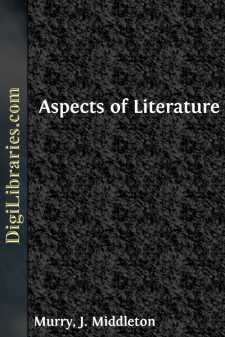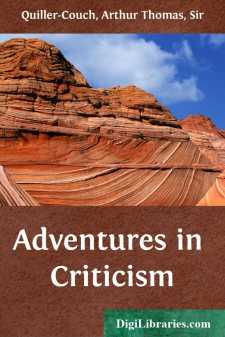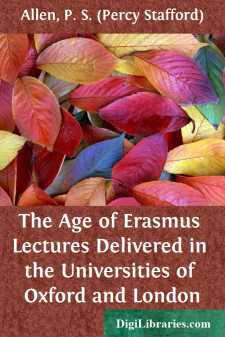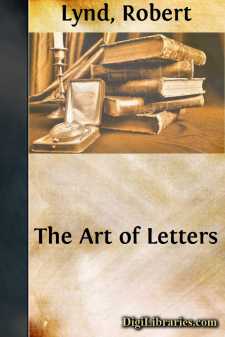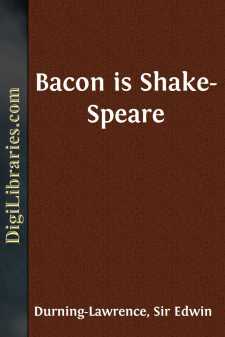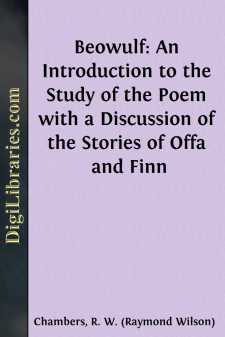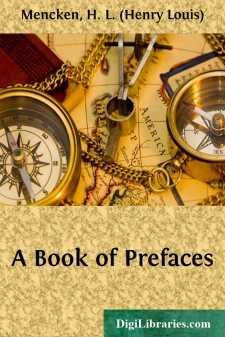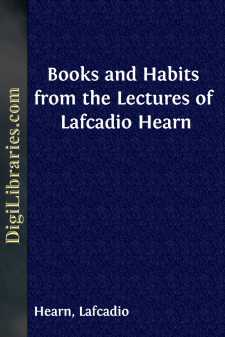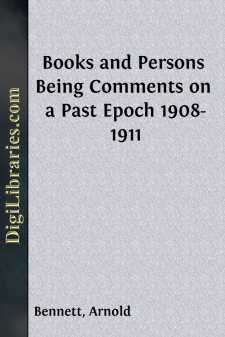Literary Criticism
- American 18
- Ancient and Classical 3
- Asian 1
- Australian & Oceanian 1
- Books & Reading 8
- Caribbean & Latin American 2
- Drama 2
- English, Irish, Scottish, Welsh 49
- European 7
- General 37
- Horror 1
- Humor 2
- Jewish 2
- Medieval 2
- Middle Eastern 3
- Poetry 7
- Renaissance 6
- Russian & Former Soviet Union 1
- Shakespeare 27
Literary Criticism Books
Sort by:
The Function of Criticism It is curious and interesting to find our younger men of letters actively concerned with the present condition of literary criticism. This is a novel preoccupation for them and one which is, we believe, symptomatic of a general hesitancy and expectation. In the world of letters everything is a little up in the air, volatile and uncrystallised. It is a world of rejections and...
more...
CHAUCER March 17, 1894. Professor Skeat's Chaucer. After twenty-five years of close toil, Professor Skeat has completed his great edition of Chaucer. It is obviously easier to be dithyrambic than critical in chronicling this event; to which indeed dithyrambs are more appropriate than criticism. For when a man writes Opus vitæ meæ at the conclusion of such a task as this, and so lays down his...
more...
by:
F. F. Arbuthnot
PREFACE. The following pages contain nothing new and nothing original, but they do contain a good deal of information gathered from various sources, and brought together under one cover. The book itself may be useful, not, perhaps, to the Professor or to the Orientalist, but to the general reader, and to the student commencing the study of Arabic. To the latter it will give some idea of the vast field...
more...
I THE ADWERT ACADEMY The importance of biography for the study of history can hardly be overrated. In a sense it is true that history should be like the law and 'care not about very small things'; concerning itself not so much with individual personality as with fundamental causes affecting the rise and fall of nations or the development of mental outlook from one age to another. But even if...
more...
by:
Robert Lynd
I.—Mr. Pepys Mr. Pepys was a Puritan. Froude once painted a portrait of Bunyan as an old Cavalier. He almost persuaded one that it was true till the later discovery of Bunyan’s name on the muster-roll of one of Cromwell’s regiments showed that he had been a Puritan from the beginning. If one calls Mr. Pepys a Puritan, however, one does not do so for the love of paradox or at a guess. He tells...
more...
The plays known as Shakespeare's are at the present time universally acknowledged to be the "Greatest birth of time," the grandest production of the human mind. Their author also is generally recognised as the greatest genius of all the ages. The more the marvellous plays are studied, the more wonderful they are seen to be. Classical scholars are amazed at the prodigious amount of...
more...
CHAPTER I THE HISTORICAL ELEMENTS Section I. The Problem. The unique MS of Beowulf may be, and if possible should be, seen by the student in the British Museum. It is a good specimen of the elegant script of Anglo-Saxon times: "a book got up with some care," as if intended for the library of a nobleman or of a monastery. Yet this MS is removed from the date when the poem was composed and from...
more...
JOSEPH CONRAD "Under all his stories there ebbs and flows a kind of tempered melancholy, a sense of seeking and not finding...." I take the words from a little book on Joseph Conrad by Wilson Follett, privately printed, and now, I believe, out of print. They define both the mood of the stories as works of art and their burden and direction as criticisms of life. Like Dreiser, Conrad is forever...
more...
by:
Lafcadio Hearn
Introduction These chapters, for the most part, are reprinted from Lafcadio Hearn’s “Interpretations of Literature,” 1915, from his “Life and Literature,” 1916, and from his “Appreciations of Poetry,” 1917. Three chapters appear here for the first time. They are all taken from the student notes of Hearn’s lectures at the University of Tokyo, 1896-1902, sufficiently described in the...
more...
by:
Arnold Bennett
WILFRED WHITTEN'S PROSE 4 Apr. '08 An important book on an important town is to be issued by Messrs. Methuen. The town is London, and the author Mr. Wilfred Whitten, known to journalism as John o' London. Considering that he comes from Newcastle-on-Tyne (or thereabouts), his pseudonym seems to stretch a point. However, Mr. Whitten is now acknowledged as one of the foremost experts in...
more...


